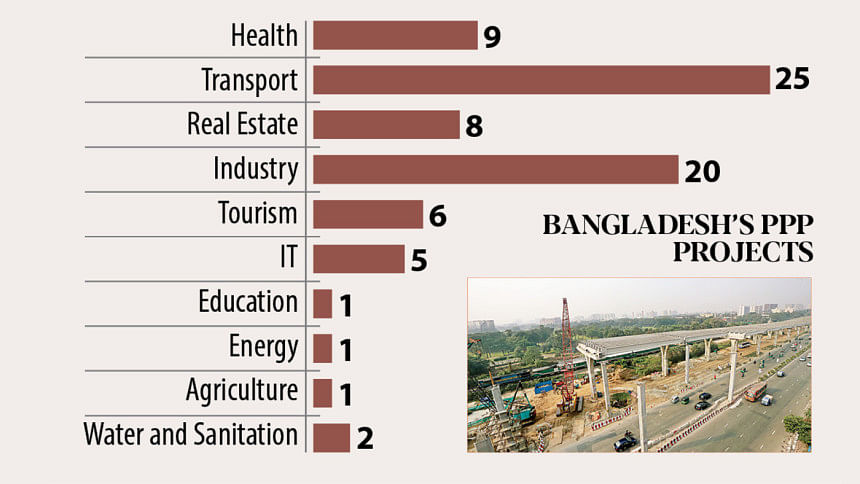Public-pvt partnership projects: Whimper drowns the hype

The more things change, the more they stay the same, observed the French writer Jean-Baptiste Alphonse Karr. And looking at the state of progress of the projects undertaken under public-private partnership (PPP), one is reminded of the saying.
Government projects getting completed on time is almost unheard of. So to give exigency to the implementation of infrastructure projects to keep pace with Bangladesh's economic aspirations, the government in 2010 decided to go the PPP way.
As many as 78 projects involving $36.5 billion were taken up under PPP. So far, only one of the projects -- haemodialysis centres in Dhaka and Chattogram implemented with Indian Sandor Medicaids -- have become operational.
This leaves one wondering: are the inherent bottlenecks a mountain too high for even the business-like private sector players to climb?
The state of implementation of the PPP projects echoes the implementation of the ongoing infrastructure projects, said Mustafizur Rahman, distinguished fellow of the Centre for Policy Dialogue.
"We see the same problems in such projects year after year."
But those are not met head-on.
As is the practice in government projects, the development project proposals are ignored, so the projects invariably end up getting revised multiple times, according to Rahman.
Negotiating with private sector players about the risks and the sharing of responsibility adds another layer of complexity, he said, adding that the delay in land acquisition is another reason for the lacklustre progress of the PPP projects.
"This causes both cost and time overruns and deprives people of proper services," Rahman added.
Mobilising finance, ensuring operational efficiency and maintaining quality are amongst the most difficult challenges for infrastructure and service projects implemented solely by the government, said M Masrur Reaz, chairman of Policy Exchange of Bangladesh, a private think-tank.
On paper, this is where PPP projects can make a big difference -- and the government can complete the critical and high-impact development projects like port and power infrastructure and special economic zones in a strict time-bound manner through this route.
In practice, the line ministries prefer to develop and implement good projects with direct government funding under the public procurement system -- sending the less appealing projects for PPP consideration, he said.
The private sector is unlikely to be interested in a PPP deal where the project lacks viability.
Another impediment to successful PPP project implementation is a lack of technical know-how on PPP and deal structuring, according to Reaz, previously a senior economist at the World Bank Group.
Line ministries often struggle to understand projects due to a lack of skilled manpower in technical matters such as the legal and financial aspects, he said, while advising the government to formulate PPP projects in close collaboration with the relevant line ministries.
"Sustainable development depends on the successful implementation of projects within the expected time and with proper quality," Reaz added.
Eight projects including the Dhaka Elevated Expressway, upgrading of Dhaka Bypass to four-lane ($350 million), blocks – 2 and 5 of Bangabandhu Hi-Tech City ($25 million), economic zone – 2 at Mirsarai ($735 million) are currently under implementation.
The rest of the projects are now at different stages of development, according to the Public-Private Partnership Authority (PPPA), which has taken public-private partnership projects in various sectors namely transport, health, shipping and tourism and development of factories.
Sultana Afroz, chief executive Officer of PPPA, acknowledged the sluggish pace of the PPP projects.
"Since I took on the responsibility of PPPA, I have been trying my best to push all the projects," she said, adding about 17 ministries have been involved.
Afroz, also a secretary, took charge in April 2020.
The first phase of the Dhaka Elevated Expressway (Airport-Mohakhali), one of the flagship PPP projects, is nearly complete and will be open to the public by the end of the year, she said, adding that the project might be completed by 2023.
To tackle the problem of technical know-how fit for PPP projects, a training session for hundred government officials will be conducted, she said.

 For all latest news, follow The Daily Star's Google News channel.
For all latest news, follow The Daily Star's Google News channel. 




Comments